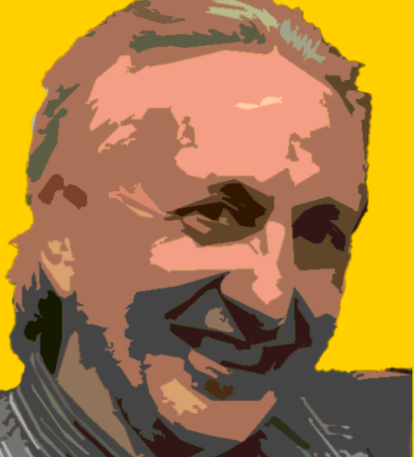With more than 50 years in the game, Roberto Codas knows a thing or two about the sustained and creative energy needed to push for sustainability in Latin America. Through experiences as a journalist, businessman, farmer, and policymaker, Roberto shares his stories and shows that influencers are of all times.
In this 10th Breakfast Brief edition, I spoke with our first guest outside of Solidaridad, Roberto Codas, a long-time sustainable development practitioner working in value chains across Latin America. I know Roberto from the old days when he served on the Latin America Continental Supervisory Board (2012-2016), and I am excited to catch up.
Today, Roberto is in Paraguay, where a mild morning is usually expected in the fall, with temperatures rising up to 30 C during the day; this makes Roberto smile.
This morning he enjoys a “Mesoamerican breakfast,” harkening back to his days living in Central America and Mexico. He lists eggs and beans, something not typical for a Paraguayan breakfast. Breakfast is his main course of the day, and he is an early bird. His journey usually starts at 5 am, so you can expect a good cup of coffee to kick things off. Today he had one of his favorite coffees and this is precisely from El Salvador.
But the relationship that Roberto has with Central America goes beyond the culinary aspects. Roberto has lived and worked for decades in the region. Not a minor thing to mention is that his wife and kids are Salvadorans. The story goes back to the ’70s.
One could make an analogy between the history of Solidaridad and Roberto’s personal story. About 52 years ago, back in the ’70s, Solidaridad focused its work on supporting the smallholder farmers’ movements for fair market conditions and the grassroots movements in the Central American region. And so did Roberto, first as a journalist documenting the social and political movements in Honduras, El Salvador, and Nicaragua during the Somoza times.
When the whole Latin American region was in convulsion between the 70s and 80s, the dictatorships in South America and the civil wars in Central America, Roberto had little choice but to stop his career as a journalist. The danger in the region was too high for his profession and pushed him out of Latin America temporarily when he went to the US to study economics. Roberto was in search of a deeper understanding of society. The study case of Roberto was the sugarcane industry in Brazil. This was not a coincidence; Roberto’s family comes from the sugar cane mill industry, so he was knowledgeable about some agricultural and market practices within this sector prior to his study.
Part of his tasks included negotiations with business leaders and rebel leaders to look into other paths for reaching peace, and in search of the economic rebuilding and revitalization of those countries.
Roberto Codas
The UN peace mission brought him back to Latin America in 1984 to be part of a peace-settling team that focused on the socio-economic aspects of social conflicts. He was based in El Salvador and mainly worked in El Salvador, Guatemala, and Nicaragua. Poverty, and inequality were (and are) huge in the region. Part of his tasks included negotiations with business leaders and rebel leaders to look into other paths for reaching peace, and in search of the economic rebuilding and revitalization of those countries.
It was precisely during the ’80s that Solidaridad evolved into Fair Trade in Central America, to improve and change the lives of the farmers it was needed to dive into the business models.
Roberto’s work in El Salvador extended into a regional group of thought leaders looking into options for the postwar period. A multi-country research team was founded at the end of the ’80s collaborating with projects from the Jesuit community. And that is how Roberto found his life in El Salvador and moved to the countryside. His favoritism for the Salvadoran coffee is perhaps related to the fact that he purchased a coffee farm in that country and transformed it into an organic farm, catalyzing his involvement with sustainability practices all around the Central American region.
With this mosaic of knowledge and experiences, Roberto and his family left Central America and relocated to Paraguay when the dictatorship ended. Here he got involved at the end of the ’80s with Greenpeace to start and expand the organization in Latin America. As a member of the International Board of Greenpeace, he tried to bring the organization to the point of engaging constructively with the business sector. He was not successful at this then.
It was in the ’90s that Sustainability became an international topic; the transformation of the business sector started to be discussed also within Solidaridad, from FairTrade moving into the triangle of People, Planet, and Profit perspective.
The adventure of Roberto with Sustainability became particularly exciting with the proposal for sustainable organic sugarcane production. Early on, he was invited by Jorge Zorreguieta to participate in a sugarcane congress in Argentina. Roberto became very unpopular when presenting his proposal for organic sugarcane. Of all attendees, only one person dared to clap when he finished his presentation. This person was Stephan Schmidheiny, a Swiss philanthropist and the founding father of the Avina Foundation, where he was invited to collaborate, under an ‘eco-efficiency’ framework.
Roberto became very unpopular when presenting his proposal for organic sugarcane.
Roberto Codas
Solidaridad was at the same time phasing out from consumer labels to corporate social responsibility models. The start of a new era with the Global commodity round tables and the triple bottom line approach had arrived. Working with companies towards a sector transformation of the global value chains.
Roberto shares with detail the path he has followed in his search for sustainability opportunities within Latin America, from sugar cane to soy. And as with Solidaridad, he aims to reach a speed at scale within good production practices.

